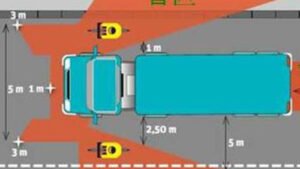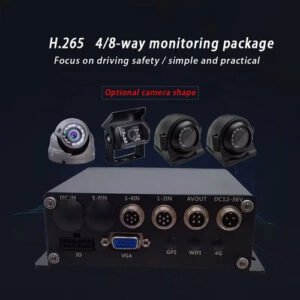Introduction to AI-MDVR Technology
Artificial Intelligence Mobile Digital Video Recorder (AI-MDVR) technology represents a fusion of conventional mobile digital video recording systems with advanced artificial intelligence capabilities. This integration is repositioning the landscape of fleet management, not only by enhancing operational efficiency but also by significantly improving safety measures for drivers and fleet assets. With AI-MDVR, fleet operators can harness intelligent data analysis, automated incident detection, and real-time monitoring to facilitate more informed decision-making processes.
The traditional MDVR has been employed widely for recording vehicle activity through cameras installed in and around the vehicle. However, with the advent of AI, this technology can now analyze recorded footage in real time, providing a robust set of tools for fleet managers. The AI component can process vast amounts of information rapidly, enabling it to detect potential hazards, assess driver behavior, and monitor compliance with safety regulations. This analytical capability leads to proactive interventions that can prevent accidents before they occur, thus enhancing overall fleet safety.
Moreover, the integration of AI-MDVR systems into fleet management processes allows for improved data collection. By amalgamating data from various sensors and video feeds, fleet managers can gain comprehensive insights into operational performance. These insights are invaluable for optimizing routes, reducing fuel consumption, and identifying areas where driver training may be required. The evolution towards AI-MDVR technology thus signifies a transformative step in how fleets are managed, blending advanced technology with innovative strategies to foster safer and more efficient operations.
Understanding Fleet Management Challenges
Fleet management operates in a dynamic environment, presenting a range of challenges that operators must navigate to ensure optimal performance. One of the primary challenges is vehicle tracking. With large fleets, maintaining real-time visibility on vehicle locations can be a daunting task. Improper tracking can lead to inefficiencies, increased costs, and difficulties in meeting client expectations. Effective vehicle tracking is essential for ensuring that routes are adhered to and delays are minimized.
Another significant challenge lies in monitoring driver behavior. Fleet managers need to assess how drivers are operating the vehicles to promote safe practices and reduce accidents. Poor driving behavior, such as harsh braking or rapid acceleration, not only increases the risk of accidents but also contributes to wear and tear on vehicles, thereby escalating maintenance costs. Implementing solutions that monitor and analyze driver behavior can help identify areas for improvement and enhance overall safety.
Route optimization is yet another critical factor. Efficient route planning is necessary to minimize fuel consumption and maximize delivery efficiency. However, traffic patterns, road conditions, and unforeseen disruptions can complicate the optimization process. Without robust systems in place, fleets may suffer from delays, leading to increased operational costs and reduced service quality.
Safety compliance poses yet another challenge in fleet management. Regulations regarding driver hours, vehicle inspections, and overall safety standards require diligent adherence. Non-compliance can result in severe penalties and legal repercussions, further burdening fleet operators. This illustrates the necessity for comprehensive solutions that not only enable compliance but also streamline fleet operations.
These challenges in fleet management showcase the need for innovative solutions. Technologies like AI-MDVR provide the necessary tools to address these issues effectively, enhancing efficiency and safety across the fleet.
How AI-MDVR Works
AI-MDVR, or Artificial Intelligence Mobile Digital Video Recorder, operates through a complex interplay of advanced technologies designed to maximize efficiency and safety in fleet management. The core function of an AI-MDVR system is to collect video footage from various angles around commercial vehicles, using strategically placed high-definition cameras. These devices are not only capable of recording incidents but also provide real-time streaming of the captured content, which can be accessed remotely by fleet managers.
The collected video footage undergoes a rigorous analysis process powered by machine learning algorithms. By employing facial recognition technology, AI-MDVR systems can monitor driver behavior, ensuring that operators are alert and focused while on the road. The behavior analysis feature identifies patterns in driver actions such as speeding, sudden braking, or distracted driving. This data is invaluable in promoting safer driving practices, as it allows fleet managers to intervene proactively when concerning patterns are detected.
Moreover, the AI component of MDVR systems enhances decision-making through predictive analytics. By analyzing historical data alongside real-time video feeds, these systems can forecast potential incidents or maintenance needs, thus preventing accidents before they occur. The predictive capabilities stem from advanced algorithms that learn from prior events, allowing fleets to refine their operational strategies continually. As a result, AI-MDVR not only assists in compliance with safety regulations but also contributes to reducing operational costs by optimizing vehicle performance and driver management.
In essence, the integration of AI and MDVR technology transforms traditional fleet management practices into dynamic, data-driven operations that prioritize both efficiency and safety. This holistic approach leverages the power of technology to create a safer and more efficient environment for transportation fleets.
Benefits of AI-MDVR for Fleet Efficiency
The incorporation of AI-MDVR (Artificial Intelligence Multi-Domain Video Recorders) systems into fleet management offers numerous advantages that significantly enhance operational efficiency. One of the critical benefits of AI-MDVR systems is their capability to optimize routing for vehicles. By utilizing real-time data, these systems can analyze traffic conditions, weather patterns, and other relevant factors to determine the most efficient routes for delivery or transport. This optimization leads to timely arrivals and improved customer satisfaction.
In addition to optimizing routes, AI-MDVR systems contribute to considerable reductions in idle time, which is often a significant cost factor for fleet operations. With advanced algorithms, these systems can track when vehicles are stationary beyond necessary stops. By identifying patterns in idle behavior, fleet managers can implement strategies to minimize downtime, thus ensuring that each vehicle is utilized as effectively as possible.
Moreover, improvements in fuel efficiency are another notable advantage of AI-MDVR systems. Through data analytics, fleet managers can monitor fuel consumption patterns, making it easier to identify inefficient driving behaviors such as excessive idling or rapid acceleration. With this insight, drivers can be trained on best practices, leading to reduced fuel expenses and a sustainable approach to fleet management.
Ultimately, the integration of AI-MDVR technology promotes enhanced operational efficiencies. By mitigating costs associated with fuel and minimizing vehicle idle time, fleets can redirect resources towards other critical areas, such as vehicle maintenance and driver training. When combined, these factors lead to improved overall performance and cost-effective fleet management strategies, serving both economic and environmental goals.
Enhancing Safety with AI-MDVR
The implementation of AI-MDVR (Artificial Intelligence Mobile Digital Video Recorder) technology in fleet management is revolutionizing the approach to safety in transportation. One significant advantage of AI-MDVR is its capability to provide real-time alerts, which are crucial in preventing accidents. These systems utilize advanced algorithms to analyze driving patterns and external conditions, allowing for immediate alerts to be sent to drivers when dangers are detected. This proactive measure helps to address potential hazards before they escalate into serious incidents.
Moreover, AI-MDVR plays a pivotal role in monitoring driver behavior. By collecting data on aspects such as speed, braking patterns, and adherence to traffic rules, these systems enable fleet managers to assess and address risky behaviors effectively. This not only helps in identifying drivers who may need additional training but also fosters a culture of safety within the organization. Consistent feedback generated by AI-MDVR can motivate drivers to adopt safer driving practices, ultimately reducing the likelihood of accidents.
Another aspect of safety enhancement lies in compliance with safety regulations. AI-MDVR systems are often equipped with features that ensure fleets meet various legal requirements. By integrating compliance checks into daily operations, fleet managers can be assured that all vehicles adhere to safety standards without the added burden of manual inspections. This integration simplifies documenting compliance, reducing administrative workload while enhancing safety measures. Additionally, the comprehensive data generated by AI-MDVR can serve as vital evidence in case of disputes, further solidifying the adherence to safety protocols.
In conclusion, the integration of AI-MDVR technology not only optimizes operational efficiency but fundamentally enhances safety within fleet management systems. By preventing accidents through real-time alerts, monitoring driver behavior, and ensuring compliance with safety regulations, fleets can expect a marked improvement in their safety standards.
Real-World Applications and Case Studies
As the demand for enhanced efficiency and safety in fleet management grows, a range of organizations have turned to AI-MDVR systems to address these challenges effectively. These advanced technology solutions utilize artificial intelligence capabilities to provide insights that can significantly optimize operations. One notable example is a major logistics company that integrated AI-MDVR into its fleet of over 2,000 vehicles. By leveraging this technology, the organization was able to monitor driver behaviors, such as speeding or harsh braking, which led to a 30% reduction in accidents over a year. This not only improved the safety of the drivers but also decreased overall liability costs for the company.
Another compelling case involves a public transportation agency that implemented AI-MDVR to enhance the safety of its services. Through real-time video analysis and incident detection features, the agency was able to identify risky driving patterns and intervene before incidents occurred. Following deployment, the agency recorded a 20% decrease in on-road incidents and improved the response times to emergencies, reinforcing public confidence in the safety of their transportation options.
Similarly, a waste management company adopted AI-MDVR technology to optimize its operations. By capturing data on route efficiency and vehicle maintenance needs, the company achieved a remarkable 15% reduction in fuel consumption, leading to significant cost savings. Furthermore, the real-time monitoring provided by AI-MDVR allowed for timely maintenance scheduling, reducing the risk of breakdowns during critical operational hours.
These case studies illustrate that organizations across various sectors are successfully implementing AI-MDVR systems within their fleet management strategies. The tangible improvements in both safety and efficiency underscore the transformative potential of this technology. As more companies recognize the value it brings, adoption is likely to expand, setting a new standard for fleet management practices worldwide.
Integration with Other Technologies
The integration of AI-MDVR (Artificial Intelligence Mobile Digital Video Recorder) systems with various fleet management technologies significantly enhances operational efficiency and safety. One of the most prominent technologies for this integration is GPS tracking. By combining AI-MDVR with GPS, fleet operators can gain real-time insights into vehicle locations and driving behaviors. This synergy allows for more informed decision-making, as fleet managers can monitor route efficiency and identify potential delays, enabling prompt adjustments to optimize routes.
Telematics also plays a crucial role in the integration with AI-MDVR systems. Telematics involves the collection and analysis of data from vehicles, providing valuable information about performance metrics such as fuel consumption, maintenance needs, and driver behavior. When AI-MDVR is integrated with telematics, fleet managers can leverage AI algorithms to analyze video footage alongside telematics data. This combination offers a comprehensive view of both visual and operational parameters, helping identify areas for improvement and implementing targeted training for drivers to enhance safety and operational effectiveness.
Furthermore, incorporating AI-MDVR systems with Transportation Management Systems (TMS) can streamline overall operations. A TMS facilitates the planning, execution, and optimization of logistics and transportation processes. By integrating AI-MDVR, managers not only benefit from tracking shipments in real-time but also from capturing video evidence of deliveries and potential incidents. This integration fosters greater accountability and transparency throughout the supply chain, as video data offers context for any discrepancies that may arise, thereby enhancing customer service
In conclusion, the collaboration of AI-MDVR with GPS tracking, telematics, and Transportation Management Systems provides a multi-faceted approach to fleet management. Each integration enhances operational capabilities, leading to improved safety and efficiency, which are critical elements for success in today’s competitive logistics environment.
Future Trends in AI-MDVR Technology
The landscape of fleet management is on the brink of a transformative shift, propelled by advancements in AI-MDVR technology. The integration of artificial intelligence within mobile digital video recording systems is anticipated to enhance operational efficiency and safety standards. Future developments are likely to focus on improving the accuracy and effectiveness of AI algorithms used for analyzing driver behavior, monitoring vehicle performance, and identifying potential safety hazards in real-time. Enhanced machine learning capabilities will enable these systems to learn from accumulated data, providing deeper insights and more accurate predictions for operators in the fleet industry.
Another significant trend is the potential regulatory changes that may influence the adoption of AI-MDVR technology. As governments worldwide increasingly prioritize road safety and emissions reduction, new regulations may emerge that require the use of advanced monitoring systems in commercial vehicles. These regulations may not only incentivize the deployment of AI-MDVR systems but also standardize their functionalities, thus fostering a more uniform approach to fleet management across different jurisdictions. Consequently, fleet operators may need to adapt to these evolving regulations, enhancing their compliance efforts through the utilization of AI-driven technologies.
Moreover, the growing emphasis on sustainability within the transportation sector is likely to influence industry practices regarding AI-MDVR technology. With a heightened awareness of environmental impacts, fleet managers will seek innovative solutions that reduce carbon footprints while maintaining efficiency. AI tools can play a pivotal role in optimizing routes, managing fuel consumption, and enhancing vehicle maintenance, contributing to an eco-friendlier operation. As the industry evolves, these AI-MDVR systems will increasingly incorporate features designed to support sustainability goals, reflecting the changing priorities of fleet management.
In conclusion, the future of AI-MDVR technology in fleet management will be shaped by advancements in AI capabilities, potential regulatory developments, and the industry’s focus on sustainability. These factors will combine to create a dynamic environment for fleet operators, pushing them toward the adoption of smarter, more efficient management solutions.
Conclusion
In recent years, the integration of AI-MDVR technology in fleet management has emerged as a transformative force, fundamentally reshaping how organizations approach safety and efficiency. By incorporating advanced AI algorithms and high-definition multi-directional video recording capabilities, fleets can now rely on more accurate and timely data to enhance decision-making processes. This evolution in technology not only mitigates risk but also promotes operational efficiency.
Throughout this discussion, we have highlighted several benefits associated with AI-MDVR systems. Foremost among these is improved safety, as real-time analytics facilitate quicker responses to incidents and enhance driver training. Moreover, the ability to monitor driver behaviors and vehicle performance creates an environment conducive to continuous improvement and accountability. Companies leveraging AI-MDVR can expect to see a reduction in accident rates, leading to lowered insurance costs and enhanced reputational standing in the marketplace.
Furthermore, the operational efficiencies gained through the use of artificial intelligence cannot be overstated. By automating various aspects of data collection and analysis, fleet managers can dedicate more resources to strategic planning and execution. The comprehensive insights provided by these systems enable proactive maintenance and route optimization, culminating in significant cost savings and increased productivity. Organizations that embrace AI-MDVR technology position themselves advantageously, staying ahead of competitors who may hesitate to adapt to these advancements.
In conclusion, adopting AI-MDVR technology is not merely an upgrade; it is a vital step toward redefining fleet management. The synthesis of enhanced safety and improved operational efficiency presents an appealing case for fleet operators to invest in this innovative solution. As the technology continues to evolve, those who harness its potential will likely lead the way in setting new industry standards, paving the path to a safer and more efficient future.






